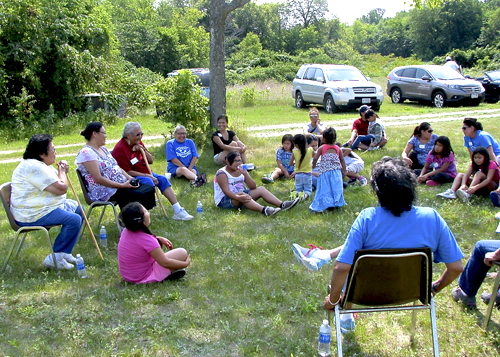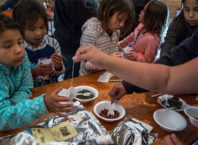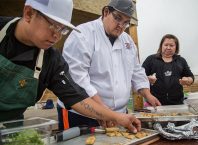 For the second year in a row, the Red
For the second year in a row, the Red
Lake Band of Chippewa Indians hosted an Ojibwe Language and Culture
Camp for youth. The camp was held on Aug. 5-7 at the Ponemah Round
House.
The three-day Gabeshiwin (camp) hosted
by Red Lake Chemical Health, Red Lake Economic Development and
Planning, and the Boys and Girls Club featured eating
traditional foods, lacrosse, games, plant gathering practices and
identification, birch bark crafts, traditional Anishinaabe teachings
and more. Gabeshiwin is a part of Red Lake Nation’s Ojibwemowin
Revitalization efforts.
Concerned that language and tradition
will disappear as elders die, natives of Red Lake Nation – and
across the country – are focused on language revitalization and
related efforts to retain tribal culture. Much of indigenous culture
depends on native language, as many concepts just cannot be
translated to English.
The camp was held near Ponemah Point,
the peninsula home to more than half of the remaining fluent
Ojibwemowin speakers in the United States.
Sam Strong, Director of Red Lake
Economic Development, and a major sponsor of Gabeshiwin provided some
background. “Our language was basically stripped from us a
generation or two ago. The children were forbidden to talk their
native language.”
A living generation still remembers
how U.S. government authorities swept onto reservations and carried
Ojibwe children off to boarding schools to assimilate to the white
culture. The ripple effects of that action are still being felt by
tribes today.
“We feel if we can raise people’s
self esteem their chance of using alcohol and drugs will be less,’’
said elder and fluent speaker Murphy Thomas. "Self esteem is all
tied up with knowing who you are and having a sense of pride in your
heritage, language and culture."
“The overall philosophy is to
re-connect all people to nature and inevitably to themselves,’’
Spiritual Advisor Eugene Stillday, an elder and first speaker said.
“We know that history is a living part of the present.’’
Ojibwemowin
was heard and spoken throughout the three day Gabeshiwin by elders,
teachers, and encouragingly… some youth.Fluent speaking elders
taught cultural values for youth to remember, the Ojibwe creation
story, and the importance of gratitude among the lessons.
Among other revered practices, youth
learned the practice of making tobacco offerings to the Creator for
providing waawaashkeshina (deer) and to the deer for giving up its
life. “This is practiced with all living things taken from Mother
Earth,” Frances Miller reminded all.
The elders formed relationships with
the young people as they taught them Ojibwemowin everyday phrases
such as the often-heard ambe (let’s go), and gego (don’t), along with
being taught native names for plants and animals.
camp turned shy young men and women campers into more self-confident
youth, and with that self-assurance comes better behavior in school
and at home,” Murphy said.
The Ojibwemowin Revitalization
Advisory Committee consists of; Elizabeth "Pug" Kingbird,
Frances Miller, Anna Gibbs, Susan Johnson, Mary Lou Stillday, Eliza
Johnson, Murphy Thomas, Eugene Stillday, Donald Iceman Sr., Violet
Patterson, Arnold Kingbird, Greeting Spears, Lee Whitefeather, Carol
Barrett and John Barrett.
(Photo by Michael Meuers, Red Lake News)






